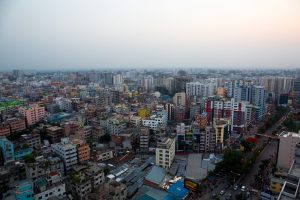Business experts have recently said that a new US immigration policy that targets Bangladesh, the country with the most exports to the US, is unlikely to have an instant effect on trade between the two countries.
They have further asserted that the issue is expected to be resolved shortly, as businesspeople from both countries are collaborating to eliminate trade barriers and enhance bilateral trade.
Imtiaz Ahmed, a renowned foreign policy expert and professor at Dhaka University, highlighted that the majority of Bangladeshi merchants are not actively involved in politics. As a result, the new visa rules are unlikely to hinder the country's exports significantly.
Ahmed further noted that although the initiative taken by the United States may have initially raised concerns among investors, the diminishing dominance of the US and the potential support from its opponents could mitigate any negative impacts.
Bangladesh, a key player in the global export market, particularly in the garment industry, exports approximately $10 billion worth of goods to the United States alone.
This surge in exports has been driven by the ongoing rivalry between the US and China, which has prompted many brands to shift their production from China to Bangladesh.
Furthermore, the United States ranks first in terms of Foreign Direct Investment (FDI) in Bangladesh, highlighting the strong economic ties between the two nations.
According to data from the Export Promotion Bureau, Bangladesh exported $10.42 billion worth of goods to the United States during the fiscal year 2021-22, with the garment industry accounting for $9.01 billion of this total.
In the first ten months of the current fiscal year, Bangladesh has exported $7.95 billion, with the garment industry alone generating approximately $7 billion. Additionally, other sectors such as domestic textiles, leather, and jute have also benefited from the US market.
On May 24, Secretary of State Antony J. Blinken announced a revised visa policy aimed at supporting Bangladesh in holding free, fair, and peaceful national elections. As per the policy, the United States will have the ability to restrict the issuance of visas to individuals believed to be involved in subverting Bangladesh's democratic election process.
It is crucial to note that the US visa policy is not an isolated action but a response to concerns over significant human rights violations. The US Treasury Department had previously sanctioned the Rapid Action Battalion (RAB) and seven current and former executives for these violations.
Moreover, Bangladesh's removal from the US International Development Finance Corporation was primarily driven by concerns related to labor rights.
Faruque Hassan, president of the Bangladesh Garment Manufacturers and Exporters Association (BGMEA), has expressed confidence that the new visa policy will not impact bilateral trade. He emphasized the ongoing collaboration with American businesses to address trade barriers and secure duty-free market access for cotton-made clothing from the United States.
While political dynamics do play a role in shaping US-Bangladesh relations, it is essential for the government and other political leaders to take swift action to prevent further deterioration of the crisis. By prioritizing effective diplomatic measures and reinforcing cooperation, the two countries can ensure the continued growth of their economic ties.






















